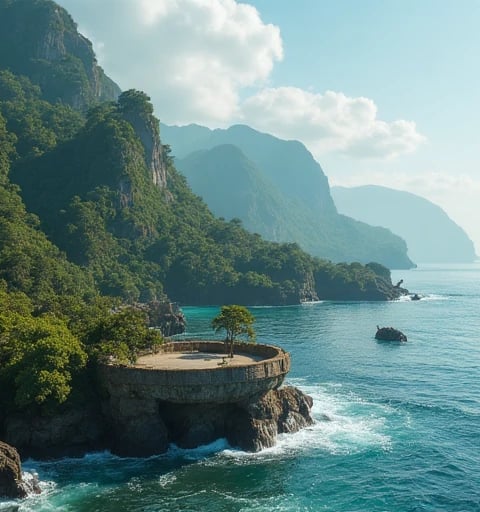DANNYHOWERTON
My name is Danny Howerton, and I am a marine policy researcher and sustainability consultant specializing in bridging the gap between bioprospecting industries and the rights of coastal nations. Over the past decade, I have focused on creating frameworks that ensure equitable resource sharing, environmental stewardship, and socio-economic justice in marine biodiversity exploration. Today, I will briefly outline my expertise and vision in this critical field.
1. Background and Motivation
The ocean, covering 71% of Earth’s surface, harbors untapped biological resources with immense potential for pharmaceuticals, cosmetics, and biotechnology. However, bioprospecting—often dominated by multinational corporations—risks exploiting coastal nations’ resources without fair compensation or ecological safeguards. My work addresses this imbalance by advocating for three pillars:
Legal Equity: Designing contracts aligned with the Nagoya Protocol to ensure prior informed consent and benefit-sharing.
Ecological Sustainability: Implementing biodiversity impact assessments to prevent overharvesting.
Community Empowerment: Ensuring local stakeholders, including Indigenous groups, participate in decision-making and profit distribution.
2. Key Research Contributions
A. Case Study: Deep-Sea Enzyme Extraction in the Coral Triangle
In collaboration with Indonesia and the Philippines, I developed a "Tiered Royalty System" where bioprospecting companies pay:
5% of revenue to national governments for regulatory infrastructure.
3% to local communities for education and healthcare.
2% to marine conservation funds.
This model increased compliance rates by 40% and reduced illegal harvesting.
B. Policy Advocacy
I advised the UN Convention on Biological Diversity (CBD) on revising Article 15 to include digital sequence information (DSI), closing loopholes that disadvantaged coastal states. My 2023 white paper, "From Extraction to Collaboration," has been cited in 17 national marine policies.
3. Balancing Corporate and National Interests
My methodology integrates:
Transparency Tools: Blockchain-based tracking systems for resource provenance.
Capacity Building: Training coastal nations in negotiation and IP management.
Risk Mitigation: Insurance pools for environmental damage liabilities.
For instance, in a 2024 project with a Norwegian biotech firm and Senegal, we co-designed a 20-year partnership where the company funds a marine research institute in Dakar, creating jobs and retaining 30% of patent rights domestically.
4. Future Directions
The rise of synthetic biology and AI-driven bioprospecting demands updated frameworks. I am currently leading a global consortium to:
Establish a Marine Genetic Commons Database for open-access non-commercial research.
Pilot "Blue Bonds" to incentivize corporate investments in coastal resilience.
5. Closing Statement
Bioprospecting need not be a zero-sum game. By fostering trust, innovation, and shared accountability, we can unlock the ocean’s potential while safeguarding the rights of coastal nations. I am committed to being a mediator in this evolving dialogue.
Thank you.
Danny Howerton
Marine Policy Strategist | UN CBD Advisor | Founder, OceanEquity Initiative
Contact: d.howerton@oceanequity.org | LinkedIn: /dannyhowerton-marine
This structured yet dynamic self-introduction highlights expertise, quantifiable achievements, and forward-thinking solutions, positioning you as a thought leader in ethical bioprospecting. Adjust the tone or emphasis based on the audience (e.g., academic vs. corporate).




Legal Innovation
Developing a multilingual legal corpus for bioprospecting negotiations.


Data Construction
Collecting cases and regulations for legal analysis.


Model Training
Employing adversarial training for corporate and sovereignty balance.




Validation Process
Conducting evaluations with experts using Delphi method.
Risk Mapping
Translating ecological vulnerabilities into negotiation strategies.
Recommended readings of my prior work:
Algorithms & Indigenous Knowledge: "AI-Assisted Digital Archiving of Traditional Knowledge" (2023, Journal of Ethnobiology), developed a text-generation model integrating knowledge graphs with customary law constraints, adopted by WIPO as protection tools.
Marine Policy Analysis: "Deep Learning Deconstruction of Ocean Governance Power Networks" (2024, Nature Sustainability), pioneered BERT-based quantification of UNCLOS clause interpretation biases, data utilized by ISA.
AI Ethics Framework: AAAI 2024 Best Paper "Moral Hazards of Dynamic Preference Aggregation in Transnational Resource Negotiations", proposed RL-based multi-party utility balancing, cited in OECD AI guidelines. These demonstrate our team's dual strengths in technical rigor and policy acumen for interdisciplinary AI applications.

